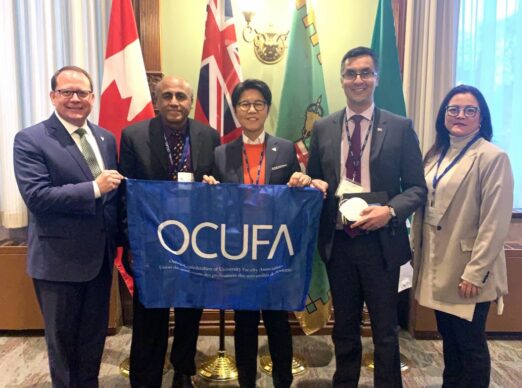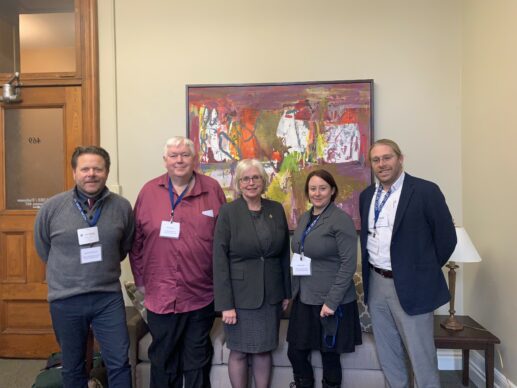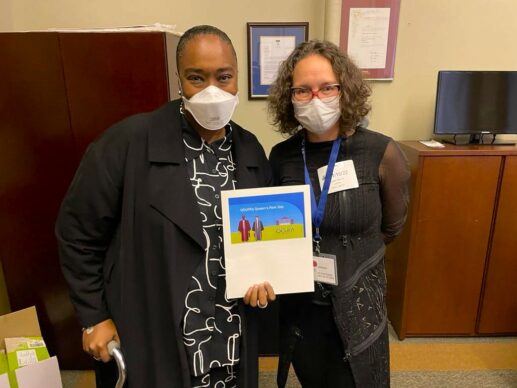In their new four-year agreement, faculty members of the University of Western Ontario Faculty Association (UWOFA) made gains on each of their six priorities:
- Support, recognize, and reward faculty effort
- Support faculty health and wellbeing
- Achieve fair and equitable workloads
- Protect collegial governance and due process
- Enhance job security for contract faculty
- Achieve equity, diversity, inclusion, and decolonization
Full-time members saw a scale increase of one per cent in each of the first three years (under Bill 124 imposed moderation) and a $1,750 lump sum increase to base along with a three per cent scale increase in the fourth year. Year four also saw an allocation of $1,023 per full-time member to the Career Trajectory Fund, with all full-time members eligible for adjustments. The comparison to similar faculty at comparator universities was removed and replaced with internal comparison only, based on gender first, and the threshold for claw-back of adjustment amount was increased.
Part-time members received a one per cent increase to scale in each of the first three years of the agreement, and a three per cent increase in the fourth year, along with a 1.2 per cent Seniority Premium per year. Payment for employer-mandated training and course-based work outside of the contract dates was added effective year one, and the course cancellation stipend was increased effective year three.
Music studio instructors will see an increase in the base hourly rate of three per cent in year four of the agreement, with a new rate for Standing Appointments at 5.17 per cent more than the base rate. A Seniority Premium of 1.2 per cent will be added to both base hourly rate and Standing Appointment hourly rate, and the Full Course Equivalent (FCE) for conducting designated ensembles has been adjusted.
Finally on compensation, a reopener clause was negotiated, committing the parties to renegotiate compensation if Bill 124 ceased to be in force in the life of the agreement.
Improvements were made to the mental health benefits co-pay arrangement and the mental health providers list was expanded to include psychotherapists, nurses, occupation therapists, social workers, clinical counsellors, and marriage and family therapists. Vision care coverage was also increased. Members also saw improvements in provisions related to pregnancy, parental and adoption leave, compassionate leave, caregiving leave, and LTD leave. The agreement contains a Promotion Bonus, effective year four, upon promotion to Associate Professor and Professor and upon receipt of tenure for those hired as Probationary Associate Professor.
On benefits for part-time members, a Joint Working Group will examine the feasibility of benefit options to replace pay in lieu of benefits, with agreed-upon recommendations to be implemented within the life of the agreement. Part-Time faculty also gained an increase in Professional Expense Reimbursement (PER).
Contract faculty made significant gains on job security. The time required for Limited Term Appointments (LTAs) to become eligible for consideration for permanent Limited-Term No End Date (LT NED) status has been shortened from 12 to 10 years of continuous Limited Term Appointment. The criterion for eligibility for a half-course Standing Appointment has also been expanded. Twelve LTAs will be created for the conversion of Limited Duties Appointments for eligible Part-Time members, with efforts made to ensure that 50 percent of these positions are in the faculties of Arts & Humanities, Music, Information and Media Studies and Education, and at least half of these in Arts & Humanities and Music. The term of these LTA conversions is now three years, as against two previously, and is renewable.
Under a new LOU, a minimum of six Teaching Scholar positions are to be created in the period of the collective agreement, with a requirement to recruit at least six of those positions internally from among current Limited-Term and Part-Time members. The workload balance for Teaching Scholars has been specified to make service and scholarship activities approximately equal (formalizing a 60-20-20 balance)
The frequency of performance evaluations has been changed to once every three years. However, members who are assessed below the acceptable level in at least one of Research, Teaching, Scholarship Activity or Service, are required to undergo evaluation annually. The agreement stipulates that Performance Evaluation is optional for Part-Time members, adds a provision for a member on LTD to receive the same assessment as in the previous evaluation prior to the leave, and provides for a review of the workload of members from equity-deserving groups.
The Workload Committee has been expanded to ensure representation of the range of teaching done in the Unit and training prescribed for Committee members. The agreement significantly expands the aspects of workload that must be addressed in the workload document which establishes the “normal workload” for the Unit. It requires the Workload Committee to determine the (normally greater) weighting of experiential learning courses and stipulates that members will be provided appropriate recognition (course release, workload adjustment, or compensation) for the work involved in creating a new experiential learning course.
The agreement contains a new clause tying workload to complement, stating that the retirement or resignation of a member should not result in an increase in the workload of full-time members in the Unit.
Also noteworthy in the new agreement is language: granting members who have held a Limited-Term Appointment for at least five years at the rank of Lecturer or Assistant Professor at the time of retirement Professor Emerita/Emeritus status upon recommendation of the Dean; requiring Members who employ students whom they teach, advise or supervise, or in the evaluation of whose academic work they have responsibilities, to provide the Dean certain specified information about the employment and requiring the Employer to remind such members of their legal responsibilities associated with the employment relationship; clarifying the discipline process; forming a Joint Working Group on Members with Disabilities; and extending the terms of LOUs on COVID-19 Pandemic Provisions to consider the impact of COVID in the Performance Evaluation, and note probationary term extensions and postponement of sabbatical leaves due to the pandemic.
A dedicated Indigenous Faculty Members Side Table continues its work in a commitment to amend the collective agreement to appropriately recognize the work of Indigenous Scholars, and to take into account specific aspects or Indigenous Scholars’ working conditions.








